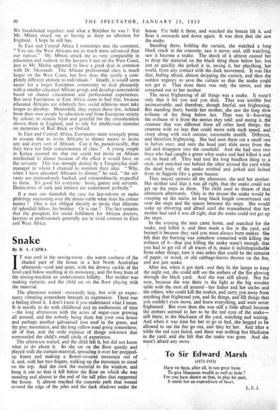Snake
IT was cool in the sewing-room—the warm coolness of the shaded part of the house in a hot North Australian afternoon—cool and quiet, with the drowsy cackle of the fowl-yard below soothing in its monotony, and the busy hum of the sewing-machine an undercurrent lullaby. Her mother was making curtains, and the child sat on the floor playing with the material.
The afternoon waited—outwardly lazy, but with an expec- - tancy vibrating somewhere beneath its expression. There was a feeling about it. I don't know if you understand what I mean. It is mainly to do with childhood and its endlessness of time —the long afternoons with the acres of sugar-cane growing all around, and the nobody being there but your own house and perhaps another galvanised iron roof in the green, and the grey mountains, and the long yellow road going somewhere; all of that, and the wide expanse of things unknown that surrounded the child's small circle of experience.
The afternoon waited, and the child felt it, but did not know what to do about it. So she sat on the floor quietly and played with the curtain-material, spreading it over her propped- up knees and making a flower-covered mountain out of it, and, with her two fingers, walking up the mountain to stand on the top. And she took the material to the window, and hung it out so that it fell below the floor on which she was standing and almost to the end of the tall piles that supported the house. It almost reached the concrete path that wound around the edge of the piles and the dark shadows under the house. The held it there, and watched the breeze lift it, and float it outwards and down again. It was then that she saw the snake.
Standing there, holding the curtain, she watched a long black crack in the concrete; saw it move; and, still watching, saw it become a snake. The shock of it almost caused her to drop the material on the black thing there below her, but just as quickly she jerked it in, saving it, her plaything, her world, from any contact with the dark movement. It was like that, feeling afraid, almost dropping the curtain, and then the sudden urgency to save the curtain so that the snake eould not get it. That done there was only the terror, and she screamed out to her Mother.
The most frightening of all things was a snake. It wasn't only that it bit you and you died. That was terrible but inconceivable, and therefore, though fearful, not frightening. But standing there, beside her mother, she saw the long slow evilness of the thing below her. That was it—knowing the evilness of it from the stories they told; and seeing it, the creature that was different from all other land things; the creature with no legs that could move with such speed, and . creep along with such sinister, inexorable stealth. Different, and therefore frightening. She had seen them tut a small one in halves once, and seen the head part slide away from the tail and disappear into the canefield. And she had seen two boys who had caught a green whip snake and had killed it and cut its head off. They had tied the long headless thing to a stick, and marched one behind the other around the yard while the dead body of the snake writhed and jerked and lashed from its flagpole like a green banner.
They stayed upstairs all the afternoon, she and her mother. Her mother said that it was all right, that the snake could not get up the steps to them. The child used to dream of that afternoon afterwards. Only in the dream the snake would be creeping up the stairs, its long black length concertinaed out over the steps and the spaces between the steps. She would wake up shivering and afraid until she remembered that her mother had said it was all right, that the snake could not get up the steps.
In the evening the men came home, and searched for the snake, and killed it, and then made a fire in the yard, and burned it because they said you must always burn snakes. She felt that the burning was somehow connected with killing the evilness of it—that just killing the snake wasn't enough, that you had to get rid of all traces of it, make it indistinguishable from other things, turn it into ashes that could be the remains of paper, or wood, or old cabbage-leaves thrown on the fire, and not just snake.
After tea, when it got dark, and they lit the lamps to keep the night out, she could still see the embers of the fire glowing through the black yard. And she was still afraid. Not for now, because she was there in the light at the big wooden table with the men all around—her father and her uncles and the others, who could kill the snakes, and carry you away from anything that frightened you, and fix things, and lift things that you couldn't even move, and knew everything, and were never frightened. But even Men she was still a little afraid because the embers seemed to her to be the red eyes of the snake— still there, in the blackness of the yard, watching and waiting. And when it was time for her to go to bed, she begged to be allowed to see the fire go out, and they let her. And after a while the red eyes faded, and there was nothing but blackness in the yard, and she felt that the snake was gone. And she wasn't afraid any more.


































 Previous page
Previous page